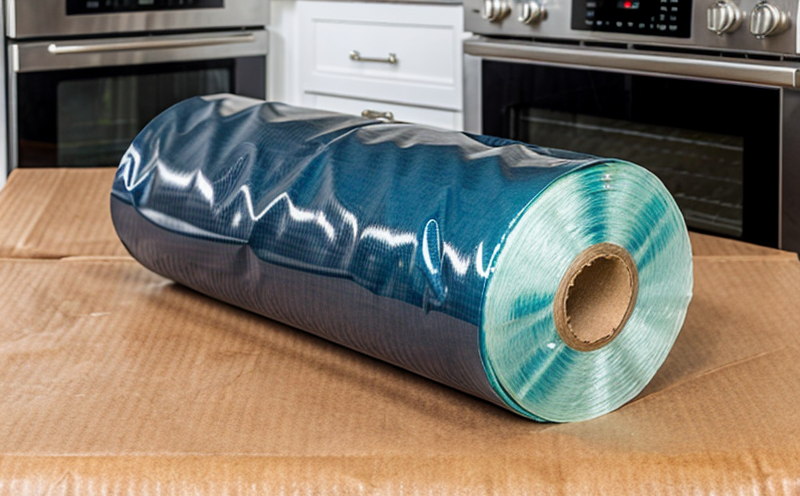BS EN ISO 178 Flexural Properties Testing of Plastic Wraps
The BS EN ISO 178 standard provides a detailed procedure to determine the flexural modulus, flexural strength, and flexural strain at yield for plastic materials under static bending conditions. This testing method is particularly relevant for evaluating the mechanical properties of polymer-based household wraps and covers that are subjected to bending stresses in real-world applications.
Plastic wraps used in households often undergo significant stress due to their frequent handling, storage, and use. Understanding these materials' flexural properties helps manufacturers ensure durability, reliability, and compliance with industry standards. Flexural testing is crucial for quality control processes as it provides insights into how the material will perform under bending loads.
The BS EN ISO 178 procedure involves a three-point bend test where samples of plastic wraps are clamped at two points and loaded in the middle until failure or yielding occurs. This method allows for precise measurement of the flexural modulus, which is indicative of the stiffness of the material, and the flexural strength, which indicates its resistance to fracture.
Proper specimen preparation is critical for accurate results. Samples should be cut from the center third of a roll, free from defects such as wrinkles or tears, ensuring they represent typical commercial products accurately. The samples are then conditioned in a controlled environment according to specified humidity and temperature conditions before testing.
The equipment used includes a universal testing machine capable of applying bending loads with high precision. The test setup ensures that the loading is precisely aligned along the sample's centerline to minimize errors due to misalignment or skewing.
Test results are typically reported as the flexural modulus, flexural strength, and flexural strain at yield. These values help in assessing whether a particular plastic wrap meets specified performance criteria set by standards such as BS EN ISO 178.
The significance of this test lies in its ability to predict how household wraps will perform under various conditions encountered during use. It is particularly valuable for applications where the material must withstand bending stresses without failure, such as in food packaging or storage containers.
Quality managers and compliance officers can rely on flexural testing results to ensure product consistency and adherence to regulatory requirements. R&D engineers benefit from this data by optimizing formulations and improving product performance. Procurement teams use these insights to select suppliers who provide materials meeting stringent quality benchmarks.
In summary, BS EN ISO 178 flexural properties testing is essential for assessing the mechanical integrity of plastic wraps used in household applications. By providing accurate measurements of modulus, strength, and strain at yield, this test supports informed decision-making across various stages of product development and manufacturing processes.
Benefits
- Enhanced Product Quality: Ensures that the plastic wraps meet stringent mechanical property requirements, leading to superior performance and reliability.
- Compliance Assurance: Helps manufacturers comply with international standards like BS EN ISO 178, ensuring regulatory adherence.
- Informed Decision-Making: Provides critical data for quality control, R&D, and procurement departments, enabling better strategic planning.
- Improved Customer Satisfaction: By delivering products that consistently meet or exceed expectations, businesses enhance customer satisfaction and loyalty.
The accurate determination of flexural properties through BS EN ISO 178 testing not only enhances product quality but also ensures compliance with international standards. This, in turn, leads to improved customer satisfaction and trust in the brand.
Eurolab Advantages
EuroLab stands out as a premier provider of BS EN ISO 178 flexural properties testing for plastic wraps due to its comprehensive approach, state-of-the-art facilities, and experienced team. Our advanced universal testing machines allow us to conduct precise three-point bend tests, ensuring accurate measurements of modulus, strength, and strain at yield.
Our laboratory adheres strictly to international standards, providing reliable and consistent test results that are recognized globally. With a reputation for excellence in polymer and plastics testing, we offer services tailored specifically to meet the needs of our clients across various sectors, including household goods manufacturing.
We pride ourselves on offering swift turnaround times and detailed reporting, making it easier for our customers to integrate test results into their product development processes. Our commitment to quality is reflected not only in our technical expertise but also in our unwavering dedication to delivering accurate, reliable, and relevant data.
International Acceptance and Recognition
- Global Standard: BS EN ISO 178 is widely recognized across Europe and internationally as the standard for flexural properties testing of plastic materials.
- Certified Facilities: EuroLab's facilities are certified to conduct this testing according to international standards, ensuring accurate and consistent results worldwide.
- Industry Trust: Our reputation for providing reliable test data is well-established within the industry, earning trust from manufacturers and suppliers alike.
- Regulatory Compliance: The results of our tests are accepted by regulatory bodies in various countries, facilitating easier compliance with international standards.
The acceptance and recognition of BS EN ISO 178 testing globally underscore its importance in the plastics industry. By adhering to this standard, manufacturers can ensure that their products meet the highest quality benchmarks, thereby gaining a competitive edge in the global market.





